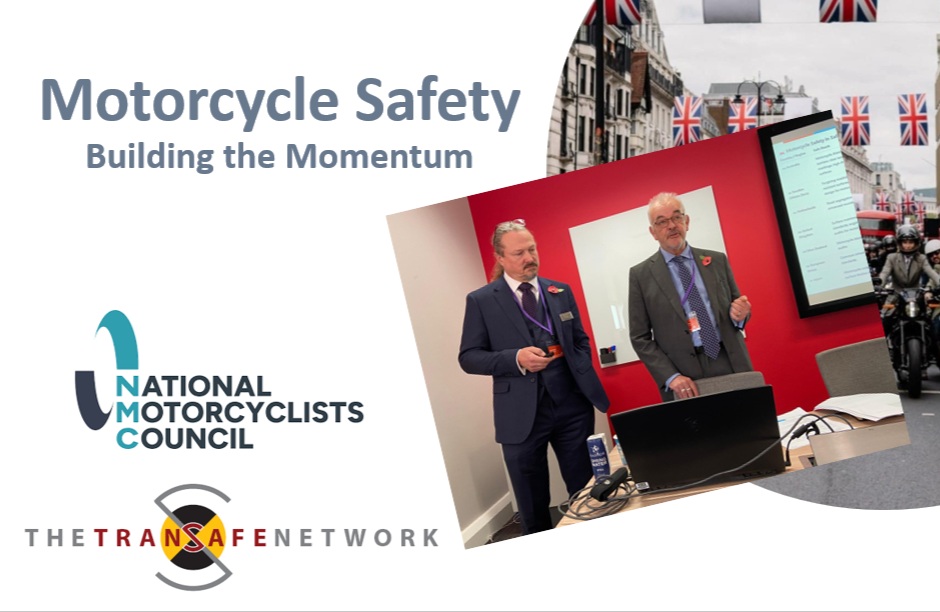

The National Motorcyclists Council (NMC) used the opportunity of the National Road Safety Conference 2025 on the 4th November to present a fresh approach to how motorcycle safety policy is considered by the Government and other authorities. At this flagship event, organised by Road Safety GB (RSGB), the NMC’s Craig Carey-Clinch and Saul Jeavons from the Transafe Network, co-presented ideas on how transport policy can be used to create a ‘virtuous circle’ of motorcycle safety which can help further drive down casualty figures. The session, entitled Motorcycle Safety – Building the Momentum, explored themes raised at the RSGB motorcycle conference last February and was well attended by several organisations and individuals, including from the Government.
Safety is often cited as a reason to exclude motorcycles from transport policy and planning, or from acceptance of them as an alternative transport mode. What happens next is that measures to improve motorcycle safety, such as access to priority areas, for example bus lanes, or other initiatives to make life less vulnerable for riders, are often misinterpreted as only being measures that encourage motorcycling which should be avoided. The result is a ‘disvirtuous circle’ as safety doesn’t improve and the original safety reason to exclude motorcycles from policy remains. The knock on effect of such thinking can have an impact on Safe Systems planning, where motorcycling is not fully recognised or catered for.
Craig and Saul drew on several international examples, where an acceptance of motorcycling as an integral and sustainable transport mode, which has benefits for improving personal mobility and reducing traffic congestion, has led to a much more proactive approach to improving rider safety. Examples from various countries revealed core transport policy approaches which include: ‘Focus on improving safety and sustainability rather than elimination’, ‘Seen as practical mobility solution’ ‘A congestion and parking solution’, ‘PTWs are accepted as an integral transport mode, not an interim problem’, ‘A core mobility mode — integrated into urban transport master plans’, ‘Motorcycles are part of formalised transit, filling public transport gaps efficiently’.
Knowledge gaps in safety were also highlighted, such as the need for much better statistical data and fresh studies which can include better information about journey purposes and currently unrecorded factors in incidents such as the riding/driving experience of those involved. In particular a much 'deeper dive' using case study analysis into causal factors is required, to enable policy makers to better understand the preventability of motorcycle crashes. With the last in-depth international study (MAIDS) now being a quarter of a century old, a need to develop an up-to-date replacement was also identified.
The presentation concluded with a proposal for a motorcycle orientated approach to ‘Safe Systems’ which includes national motorcycle safety strategies, motorcycle inclusive transport polices, with better infrastructure for riders included. Also proposed was support for post-test training and initiatives such as BikeSafe and Biker Down, plus much better data gathering and tackling issues such as fake and counterfeit motorcycle protective clothing – a theme which was the focus of a presentation later that day by clothing standards specialist Paul Varnsverry.
NMC Executive Director Craig Carey-Clinch said: “The NMC is grateful to RSGB for the opportunity to deliver this presentation. There was a great response and good feedback from those who attended and several delegates brought forward some great ideas of their own. What is very clear is that a policy of ignoring motorcycles in transport policies in the hope that this will discourage motorcycling, with the safety problem eventually going away is not a credible strategy for road safety. It has not worked in the past and it won’t work now. The presentation also revealed just how far behind several other countries the UK is when it comes to policy attitudes towards motorcycling.
“With all statistical measures of motorcycle safety stagnating since 2019 and fatalities higher than 2013 - when the current licensing, testing and training regime was introduced - it is clear that a fresh and more holistic approach to safety is needed. This must include recognition of motorcycling as a transport mode in the forthcoming Integrated National Transport Strategy, with measures to support riding, improve urban/rural access and reduce vulnerability for those who make the motorcycling choice for their journeys.
“The forthcoming Road Safety Strategy needs to set in place polices which will improve infrastructure for safer motorcycling, announce investment in motorcycle safety, support post-test training and propose further research. It also needs to finally announce the long overdue review of testing, training and licensing. Both strategies also need to support a process which will lead to a new Government Motorcycling Strategy.”
Transafe’s Saul Jeavons said: "We need better structured investigations delivering more segmented data on riders, the bikes involved in incidents and what riders are wearing when they happen. A coordinated approach involving transport policy and improved investigation data could lead to better targeted, more effective interventions.
“We hope that the Road Safety Strategy will include the establishment of the long-awaited Road Safety Investigation Branch to make sure these issues can be tackled rather than shuffled into the "difficult to address" pile."
In her video keynote address to the conference, Transport Minister Lilian Greenwood MP said that "together we can deliver the change (in road safety) that is so desperately needed". She also said that she "looked forward to developing partnerships" to deliver the necessary change. The NMC and its members stand ready to work in partnership with the Government to deliver the necessary improvements in motorcycle safety.
ENDS.
Notes to Editors
1. For further information, please contact Craig Carey-Clinch on 07979 757484 or craig@uknmc.org.
2. A copy of the presentation can be supplied on request
3. Information about the Transafe Network can be found here
(Pic: NMC and Paul Morgan CBE)
